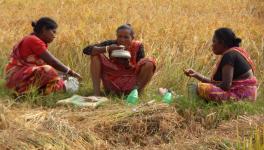Draft Anti-Trafficking Bill: Vague Provisions Will Lead to Criminalisation of Victims, Other Activities, Say Activists
New Delhi: As the Monsoon session of Parliament proceeds, the Bharatiya Janata Party-led government is giving a final push to several key Bills--one of which is the draft anti-trafficking Bill. While the government has finally given recognition to demands of protection of trafficked victims, many provisions proposed in the draft law seem vague and are intended to criminalisation of of victims.
Lawyers, civil society groups and activists have flagged major concerns that include overriding of consent, enormous powers and burden on the National Investigation Agency (NIA) and the inability to set clear deterrents. Once the Bill becomes an Act, the Centre will be mandated to set up a National Anti-Trafficking Committee and the state governments will also form such committees at state and district levels.
A Memorandum on Trafficking in persons (Prevention, Care and Rehabilitation) Bill 2021 has been released by the All India Democratic Women’s Association flagging some of these concerns.
Activists across the board have stated that the Draft Trafficking Bill has mixed up the issue of trafficking and sex work. Prostitution and Pornography have been added as definition of exploitation and sexual exploitation and are considered to be Trafficking in Persons. Consent of the victim has been made irrelevant.
Another contentious clause is the enormous powers given to the NIA. The Bill has proposed to make NIA as the “national investigating and coordinating agency responsible for prevention and combating of trafficking in persons and other offences under this Act, as well as for investigation, prosecution and coordination. Moreover, a police officer has been given the power to rescue a person if he/she has reason to believe that there is imminent danger of the person being trafficked and has to produce her /him before a magistrate.
The AIDWA memorandum highlights that “this section (11) can be misused and adults who do not want to be removed from their home can be forcibly made to do so. In section 16 of the Act, the Magistrate has also been given the power to reject an application of an adult person that he should not be placed in a rehabilitation home any longer though he is supposed to consult the District Anti Trafficking Committee on this. This can result in incarcerating a person against his will in a home. In fact, the Act seems to prefer institution based rehabilitation and not community and family based rehabilitation”.
The gravest concern is the fact that the proposed law can be misused as a wide range of people can be charged. Vague provisions can lead to blanket criminalisation of activities that do not necessarily relate to trafficking. Thus, if a young couple elope or are in a relationship, their families can implicate the boy and he can be charged with sexual exploitation under the Act apart from kidnapping, rape etc., and may end up being jailed for several years.
Speaking with NewsClick, Mariam Dhawale, general secretary of AIDWA, said: “AIDWA continuously kept flagging the problem of trafficking to the government. If we want to find a solution to this problem, if we want to rehabilitate the women trapped in this, then the government should do something about it. Normally, this government has a habit of criminalising everything this is what is being attempted through this policy. Because of this, violence on women increases. Basically, all these issues can be solved if the government honestly finds solutions to the issues of employment and poverty. This network is not as simple as bringing a girl from a village to Delhi, Kolkata or Mumbai.”
The Act also shifts the onus of proof in cases involving women and children on the person being prosecuted. This Section is thus open to misuse as a person can be incarcerated and then would have to prove his or her innocence.
Legal experts state that trafficking and sex work are two distinct things and criminalisation of prostitution is unconstitutional. The draft Bill has included prostitution and pornography in the definition of exploitation while making the issue of consent irrelevant. The Bill retains the colonial and patriarchal tinge of considering women not competent enough to have consent over their bodies and vocation, they say.
Sex workers unions have opposed the draft Bill on these grounds The National Network of Sex Workers states that the Bill will lead to the ‘raid and rescue’ model. The network in a statement said: “Sex work is defined as the rendering of sexual services by an adult person for payment or goods. It is a respectable alternative to the work adopted by millions of women, men and transpersons in India. It provides a significant income through which adults take care of their families. The deleterious effect of treating all workers as victims of trafficking will result in more common 'reformation homes' and 'forced rescue' of earning adults, whether they are domestic workers, bonded labourers, beggars, sex workers or surrogate mothers.”
The proposed law is also based on the premise that maximum sentences, including death, will have the desired effect of lessening cases of trafficking. Apart from the fact that punishments should adhere to the principle of proportionality, it has been pointed out that harsher and harsher punishments will not succeed in more convictions or act as a deterrent unless the offence is investigated and prosecuted properly.
There are also concerns about absence of community-based rehabilitation, the missing definition of reintegration and also about funds related to rehabilitation of survivors.
Get the latest reports & analysis with people's perspective on Protests, movements & deep analytical videos, discussions of the current affairs in your Telegram app. Subscribe to NewsClick's Telegram channel & get Real-Time updates on stories, as they get published on our website.
























